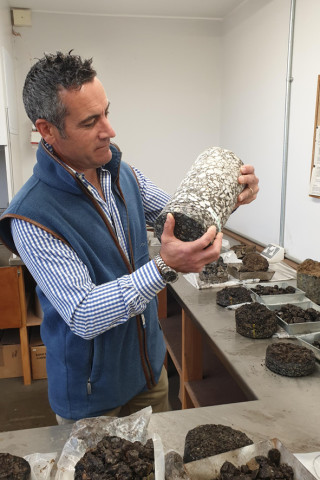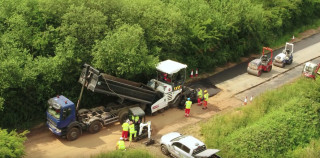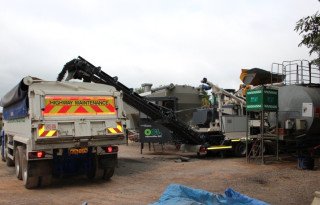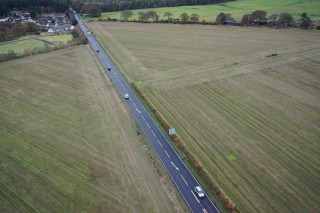Recycling old bitumen road planings isn’t a new idea – in fact there’s a well-established market for planings for use as building sub-base, hard-standings and farm tracks.
But recycling them for reincorporation into highway construction or repair is a different matter. For this application, materials have to meet strict performance criteria and, in the past, the cost and effort required to process planings to produce an acceptable product has proved uneconomic.
Nevertheless, technology has emerged that enables efficient recycling of asphalt planings, either in cold-mixing plants, by adding the milled asphalt to a new aggregate mix, or in-situ using specially-designed cold-recycling equipment.
More recently, the use of foamed bitumen as a binding agent for this process has increased in popularity. Foamed bitumen, which has been around since the 1950s, is made by adding small amounts of water to hot bitumen. The water flashes into steam, atomising the bitumen which foams up, expanding up to 30 times its original volume.
While foamed bitumen is not itself new, the idea of using it to bind cold recycled material in road construction is.
In 2014, Lincolnshire-based contractor Minster Group became one of the first companies in the UK to adopt Foambase, a foamed-bitumen-bound recycled asphalt product developed by sustainable materials specialist OCL Regeneration of Rochester, Kent. It has since transformed the way the company works, says Minster’s managing director Bruce Spencer-Knott:
“Thanks to this technology, we have saved hundreds of thousands of tonnes of material from going to landfill, cut thousands of tonnes of carbon dioxide emissions and we use it to recycle 50% of the material we remove from roads,” he says.
Minster has set up an on-site closed-loop manufacturing process to convert material that has been removed from old road surfaces into Foambase, as well as binder course products, such as cement bound granular mixtures (CBGM).
“As a result, we can create a safe and durable product on site, which produces 32% less CO2 than it would take to create traditional hot asphalt, and the material can be recycled and relaid many times in the future,” says Spencer-Knott.
The recycled CBGM material can be used in the lower layers of a road surface as well as to create 100% recycled farm tracks, industrial yards and car parks.
When it comes to roads, it’s still the case that the very top layer should be virgin asphalt to ensure a smooth, unblemished surface. But Spencer-Knott says that the 100mm-thick base layer and 100mm-thick binder course can be made up almost entirely of recycled material.
“As well as recycling 50% of the material we remove from roads, the ‘new’ material we buy for the top layer of a road is also more sustainable than it used to be,” says Spencer-Knott. He’s referring to the ground granulated blast-furance slag (GGBS), a by-product of steel production, that he buys from Tarmac.

Minster Group is now working with Lincolnshire County Council’s in-house materials laboratory, to raise the quantity of recycled material in the authority’s roads from 50% to 90%.
“We’re working to create systems which will significantly reduce the reliance on quarries, prevent more material from going to waste and reduce the distance that material has to be transported,” explains Spencer-Knott. “To help us reach our goal, we’re testing ways of reliably and practically making high-quality, durable roads that require only a small amount of completely new material.
“Of course, researching and developing a new way of creating roads is a complex and sensitive process because everything that gets used on roads has to be of the highest standard,” Spencer-Knott acknowledges. “However, we’re working with leading local authority testing laboratories to push the boundaries and experiment with new ways of working.”
Much of the technology that Minster Group is using to develop its new systems is similar to that already used by large suppliers to produce asphalt, but Spencer-Knott says that his systems incorporate a few important changes and alterations, as well as a recycled recipe mix that’s unique to Minster:
“Our recycling and waste reduction systems already save thousands of tonnes of mineral aggregate and crude oil from having to be extracted from the earth and cut thousands of tonnes of CO2 emissions. But this new technology will essentially double what we can achieve today,” he says.

“If we’re successful in reaching our 90% target there will also be a number of practical benefits. For example; road surfacing will be able to move away from the full dependency on coating plants, we can increase the use of mobile recycling plants to increase the use of closed loop systems, we can reduce the time it takes to complete our work, all but eliminate disposal costs and dramatically reduce our environmental impact.”

“Our goal will get ever smoother and easier to achieve once everyone across the industry realises that we need to remove the excessive reliance we have on virgin materials and quarrying. This is clearly a massive contributory factor to the release of carbon, and it can easily be removed,” he adds.
Spencer-Knott would like to see more forward-thinking within his sector, along with a willingness to keep up with the latest technology, explore new ways of working and push for new machinery.
“It’s time to make the most of innovations available and prove that it’s possible to reduce the carbon footprint of the industry and improve our service at the same time,” he says.
“We should no longer be content with keeping up with the times, we need to push ahead and lead the way.”
Meanwhile, in Scotland…
Although Minster Group sees itself as a pioneer in the development of road recycling technology, it’s not alone. Other contractors, and other materials suppliers, are energetically ploughing the same furrow and achieving similar results.
Back in February, Breedon Group announced that a section of the A92 at Ladybank, in Fife, has been successfully resurfaced using reprocessed asphalt stripped from the same stretch of road.
Breedon carried out the work in collaboration with Eurovia and Bear Scotland on behalf of an investment made by Transport Scotland.
A road planer was used to remove the existing road surface along a one kilometre length of the A92 and the planings were then transported to a special waste ‘quarantine’ zone at Breedon’s Clatchard quarry near Newburgh.
The material was reprocessed using Eurovia’s Recofoam technology – a competitor to OCL’s Foambase.
The recycled material was then returned to the A92 and used as a base layer for the newly-resurfaced road.
The process produces a fully-compliant recycled material, allowing reuse within new road construction. Breedon says that its product incorporates up to 85% recycled material and reduces CO2 emissions by around 50%.
Breedon Northern managing director Alan Mackenzie said: “This is only the second time that the Recofoam technology has been used in Scotland and it has proven its value as the most sustainable way of reprocessing worn-out asphalt. It not only cuts emissions and reduces our environmental impact – both in the production process and through fewer truck journeys – but it also significantly reduces the need for hazardous waste landfill.
“We believe this is very much the future of sustainable road maintenance and we’re proud to be helping to pioneer this technology in Scotland.”
This article was first published in the April 2020 issue of The Construction Index Magazine
UK readers can have their own copy of the magazine, in real paper, posted through their letterbox each month by taking out an annual subscription. Click for details.
Got a story? Email news@theconstructionindex.co.uk




